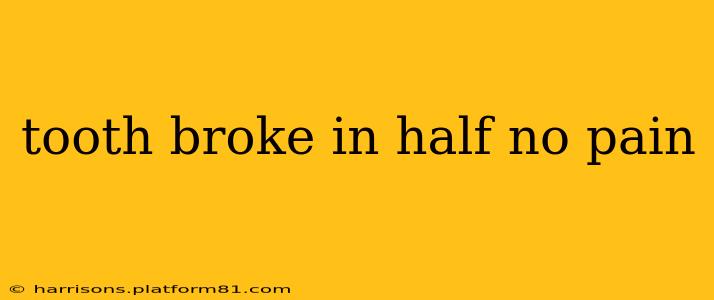A broken tooth, even without pain, is a serious dental emergency. Ignoring it can lead to more significant problems down the line, including infection, further damage, and the potential loss of the tooth. This comprehensive guide explains what to do if your tooth breaks in half without causing pain and what you can expect from your dentist.
What Causes a Tooth to Break in Half?
Several factors can contribute to a tooth breaking cleanly in half, even without immediate discomfort. These include:
- Underlying decay: Extensive cavities weaken the tooth's structure, making it more susceptible to fracturing, even under minimal pressure. The lack of pain initially could be because the nerve hasn't been exposed yet.
- Bruxism (teeth grinding): Habitual teeth grinding, often done unconsciously at night, puts immense pressure on teeth, gradually weakening them and leading to fractures.
- Trauma: An impact or blow to the mouth, even a seemingly minor one, can cause a tooth to crack. Sometimes, the fracture might not be immediately apparent.
- Weak enamel: Naturally weak enamel, due to genetics or dietary factors, leaves teeth more vulnerable to breakage.
- Large fillings: Extensive fillings can weaken the tooth, leaving it more prone to fractures, especially older amalgam fillings.
Why Isn't My Broken Tooth Hurting?
The absence of pain initially is often due to the fracture not reaching the tooth's pulp (the inner part containing nerves and blood vessels). However, this doesn't mean the problem is trivial. The crack can still allow bacteria to enter, eventually leading to infection and subsequent pain, possibly a severe toothache.
What Should I Do if My Tooth Broke in Half?
Immediate Actions:
- Rinse your mouth: Gently rinse your mouth with warm salt water to clean the area.
- Locate the broken pieces: If possible, carefully collect any broken pieces of your tooth and store them in a container of milk or saline solution. This might be helpful for your dentist.
- Apply cold compress (optional): A cold compress applied to the cheek near the broken tooth may help reduce any swelling that might develop later.
- Avoid chewing on that side: Refrain from chewing on the affected side to prevent further damage.
- Contact your dentist immediately: Schedule an appointment with your dentist as soon as possible. This is crucial for assessing the extent of the damage and determining the best course of treatment.
What Will the Dentist Do?
Your dentist will conduct a thorough examination to determine the extent of the fracture. Treatment options may vary depending on the severity of the break and the location of the fracture:
- Bonding: For minor cracks, bonding may be an option to repair the tooth.
- Crown: If a significant portion of the tooth is broken, a crown (a cap placed over the tooth) is often necessary to restore its strength and shape.
- Root Canal: If the fracture extends into the pulp, a root canal to remove the infected pulp may be required, followed by a crown.
- Extraction: In severe cases where the tooth is severely damaged and beyond repair, extraction (removal) might be the only option.
Can a Broken Tooth Heal Itself?
No, a broken tooth will not heal itself. The hard tissues of the tooth do not regenerate. Therefore, professional intervention from a dentist is essential to prevent further complications.
How Much Does Repairing a Broken Tooth Cost?
The cost of repairing a broken tooth varies significantly based on the extent of damage, the necessary treatment, your location, and your dental insurance coverage. It's best to contact your dentist for a personalized cost estimate.
How Can I Prevent My Teeth From Breaking?
Preventing tooth breakage involves:
- Maintaining good oral hygiene: Regular brushing, flossing, and dental checkups are crucial.
- Avoiding hard foods: Refrain from biting into excessively hard objects.
- Using a mouthguard: If you grind your teeth (bruxism), wear a mouthguard, especially at night.
A broken tooth, even without immediate pain, requires prompt professional attention. Don't delay seeking dental care; early intervention can often save the tooth and prevent more complex and costly procedures down the road. Remember to always consult with your dentist for personalized advice and treatment.
